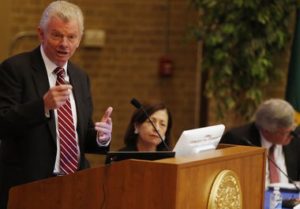 by S.P. Sullivan | NJ Advance Media for NJ.com
by S.P. Sullivan | NJ Advance Media for NJ.com
on December 08, 2016 at 7:28 AM, updated December 08, 2016 at 8:30 AM
TRENTON — Six months ago, amid concerns about the costs associated with New Jersey’s massive bail system overall, Gov. Chris Christie ordered the state’s attorney general to study what it could mean for the budgets of county prosecutors, jails and police departments.
A new report published by the state Division of Criminal Justice has given the governor his answer: There’s no way to know until after the reforms are in place.
The sweeping changes that take effect in January — which, among other things, will replace the state’s cash bail system with one that chooses whether to jail defendants based on their risk to the community — have been publicly lauded by the governor, Supreme Court justices, prosecutors, defense attorneys and civil rights advocates.
But privately, some in the criminal justice system have expressed worry over how to pay for it all.
Now supporters of the historic reforms are trying to fend off eleventh-hour challenges as taxpayers remain in the dark about what the overhaul will actually cost.
How bail reform will work in N.J.
Judicial reforms starting in January are intended to cut the time that defendants will be in jail while awaiting trial.
This week, the New Jersey Association of Counties filed a complaint with the Council on Local Mandates, an obscure state body with the power to invalidate laws it deems an unconstitutional burden on local governments.
Officials in five counties claim the money provided to them by the state as part of the bail overhaul doesn’t go nearly far enough to cover what they will spend on hiring more employees and upgrading courthouses to meet new legal requirements.
That, they argue, makes it illegal under the state constitution’s “state mandate, state pay” amendment.
The complaint specifically challenges two new requirements: that risk assessments on arrestees be performed within 48 hours, and that prosecutors work to bring cases to trial more quickly.
“We support this as good public policy, and we have all along,” John G. Donnadio, the association’s executive director, said of those reforms.
But, he added, “We’re looking at $1-to-2 million per county just to implement the new law.”
Cost estimates for the overhaul vary widely, with one study putting the price tag at $215 million statewide. In its complaint, the county association claims it will cost the county governments alone at least nearly $29 million.
Christie issued an executive order in June directing Attorney General Christopher Porrino’s office to “evaluate the costs, savings, and administrative challenges” connected to the overhaul.
The office was to examine the effects of a directive issued by the attorney general laying out how police and prosecutors should adjust to the new rules, the order said.
In a 125-page study released last week with little fanfare, the office concluded that because each county had discretion over how to meet the requirements, it was “not possible” to “project monetary amounts relating to costs or savings associated with” the reforms.
Click to read the full report.
View the entire document with DocumentCloud
A spokesman for the governor declined to comment on the report Wednesday. A spokesman for Porrino said the study “speaks for itself.”
The lengthy report instead focuses on “challenges” and “benefits” associated with the changes.
Porrino’s October directive was meant to give prosecutors “flexibility” in how they implement changes, the report said, setting up a system so police supervisors and prosecutors are available around the clock to make decisions about charges, among other changes.
The report notes that while the new system adds court proceedings related to the new risk assessments onto the plates of prosecutors, it also eliminates the need for bail reduction hearings, which “may provide further time and opportunity for pre-charging screening and for detention hearings.”
It also suggests the composition of county jails could soon change, seeing far fewer defendants behind bars simply because they cannot afford bail but an increase in the number of offenders accused of serious crimes detained based on risk assessments.
While the criminal justice reforms are still expected to take effect immediately come the new year, efforts are underway to put the changes on hold.
The county association’s complaint asks the Council on Local Mandates for an injunction until the constitutional question can be resolved. John A. Sweeney, the council’s acting chair, told NJ Advance Media on Wednesday that the body would need sworn statements about the potential harm before issuing such a ruling.
Separately, a state Assembly panel advanced legislation in November looking to roll back some of the reforms and re-implement cash bail in certain circumstances in a last-ditch effort at reining in costs.
Civil liberties advocates cried foul, saying poorer defendants shouldn’t suffer just because lawmakers and the administration may have underfunded the overhaul. Legislative leaders, including Senate President Stephen Sweeney (D-Gloucester), also vowed to fight any effort at curbing the reforms.
S.P. Sullivan may be reached at ssullivan@njadvancemedia.com. Follow him on Twitter. Find NJ.com on Facebook.
